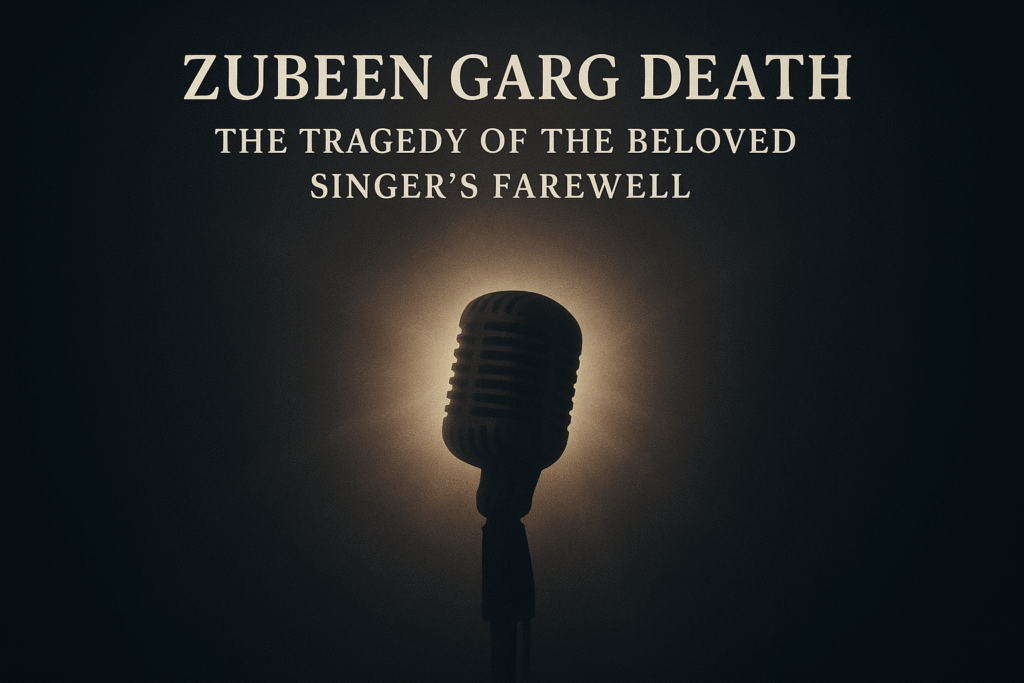
Assamese music icon Zubeen Garg died at 52 in Singapore on September 19, 2025, after a sea outing linked to scuba diving and swimming, prompting an outpouring of grief across India and the Northeast region. Reports indicate he experienced breathing difficulties during a yacht trip and was rushed to Singapore General Hospital, where he was declared dead in the ICU around the afternoon local time, with a post-mortem scheduled to determine the exact cause.
What happened
Multiple reports state Zubeen Garg fell ill during a sea activity off Singapore, with early accounts describing a scuba diving or swimming incident that led to breathing complications and an emergency transfer to Singapore General Hospital where he was pronounced dead. Assam Chief Minister Himanta Biswa Sarma said preliminary information suggested he went swimming without a life jacket at one point, and authorities in Singapore would question those accompanying him as part of the inquiry. Organizers and media timelines place his death in the early afternoon hours, with festival representatives noting he was declared dead in the ICU, while final details await autopsy confirmation.
Where and why he was in Singapore
Garg had traveled to Singapore as a cultural brand ambassador and star performer for the North East India Festival, a two-day event slated for September 20–21 at the Suntec Singapore Convention & Exhibition Centre. Following his death, organizers announced the festival’s cancellation and expressed profound grief over the loss, calling it a monumental blow to the community and the arts. Reports also indicate he was taken on a yacht outing by members of the local Assamese community before the incident, which is under scrutiny by authorities and festival stakeholders.
Conflicting reports on the cause
Early accounts vary between a scuba diving complication, a seizure after diving, and swimming without a life jacket, highlighting the uncertainty that typically follows sudden maritime incidents. The Assam Chief Minister publicly confirmed that an autopsy would be conducted to clarify the cause, and local authorities were engaging with witnesses present during the sea outing. Until official forensic results are released, media and official statements consistently emphasize that the precise medical cause remains under investigation.
Immediate reactions and tributes
Prime Minister Narendra Modi led national tributes, praising Garg’s rich contribution to music and the popularity of his renditions across diverse audiences, while offering condolences to family and admirers. Assam Chief Minister Himanta Biswa Sarma called him one of the state’s favorite sons whose voice energized generations, reflecting the depth of Garg’s cultural imprint in Assam. Fans gathered outside his Guwahati residence as news spread, underscoring the profound connection between the artist and the people of the region.
Biography and rise to fame
Born in Tura, Meghalaya, in 1972, Zubeen Garg grew into one of Assam’s most influential cultural figures over three decades as a singer, composer, lyricist, actor, and filmmaker. He broke nationally with the 2006 Bollywood hit “Ya Ali” from the film Gangster, a track that cemented his pan-Indian recognition and remains one of his most celebrated performances. He recorded across languages and industries, with All India Radio reporting a prolific output and multilingual reach that made him an emblem of Northeast India’s musical dynamism.
Milestones and musicography
Garg’s first album “Anamika” released in 1992, marking the beginning of a career that spanned Assamese, Bengali, Hindi and more, and helped bridge regional music with mainstream audiences. Coverage following his death highlights claims he recorded tens of thousands of songs across roughly 40 languages, underscoring the scale and breadth of his creative life, though exact counts can vary across sources. Even as his national fame grew through Bollywood, he remained deeply rooted in Assamese culture, often described as a unifying voice for the state.
The final day and last public moments
Media outlets reported that videos from the yacht outing and final social posts surfaced, including clips showing him in safety gear before entering the water, which are now part of the public record and context for investigators and fans. A widely shared final post invited fans to the North East Festival, adding poignancy to the abrupt end of a much-anticipated performance weekend. Fest organizers have stated they had no prior knowledge of the yacht ride arranged by members of the local community, an issue that is being examined alongside safety protocols.
The hospital timeline and official steps
Reports indicate efforts including CPR were attempted before or during transport, but he was declared dead after being taken to Singapore General Hospital’s intensive care unit, with exact timestamps varying slightly across outlets. The Assam Chief Minister and India’s Ministry of External Affairs were notified promptly, with steps initiated to bring the body back to Assam following the autopsy. Officials also confirmed that Singaporean authorities would question those present during the incident, as it is routine in such sudden-death maritime cases.
Public mourning across Assam
From Guwahati to Tura and across the Northeast, spontaneous memorials and gatherings began almost immediately, reflecting Garg’s role as more than a performer—he was a cultural touchstone for millions. News broadcasts and social media posts chronicled the palpable grief, with fans sharing old performances, unreleased clips, and personal anecdotes that captured his warmth and defiant artistic freedom. Local and national media uniformly described the loss as irreplaceable, echoing official reactions from Delhi and Dispur.
Festival cancellation and cultural implications
The North East India Festival’s cancellation underscores the magnitude of the loss for the region’s cultural calendar, as organizers and participants recalibrate in the wake of the tragedy. The festival had become a key bridge between Northeast India and Southeast Asia, and Garg’s ambassadorship was central to its 2025 edition’s appeal. His absence will likely reshape programming and tributes in the months ahead as the music community seeks fitting memorials.
Safety, diving, and lessons
While details remain under review, early accounts raise familiar maritime safety themes—life jacket usage, supervision, and immediate response—now part of the broader discussion around recreational sea activities. Officials’ emphasis on autopsy and questioning indicates a methodical approach to distinguishing medical events from procedural or equipment-related failures. Public awareness of water-safety norms often spikes after high-profile incidents, and coverage has already amplified these considerations across mainstream and social media.
Enduring legacy
Garg’s legacy rests on more than hits; it is rooted in the way he animated Assamese identity and made the state’s music intelligible and irresistible across linguistic boundaries. He demonstrated that regional stardom and national relevance are not mutually exclusive, setting a path for future artists from the Northeast to claim pan-Indian stages. Tributes from national leaders and the cancellation of a flagship cultural festival together signify the scale of his influence and the vacuum it leaves behind.
Key facts at a glance:
- Date and place of death: September 19, 2025, Singapore.
- Age: 52.
- Context: Sea outing associated with scuba diving and swimming.
- Hospital: Singapore General Hospital (ICU).
- Autopsy: Scheduled by authorities per Assam CM.
- Festival: North East India Festival canceled.
- Signature Bollywood hit: “Ya Ali” (Gangster, 2006).
- Early life: Born in Tura, Meghalaya (1972).
- Reported discography scale: Multilingual output across 40 languages with very large song count per AIR report.
- Body repatriation: Arrangements initiated to bring him back to Assam.
FAQs
Q1: What is the confirmed date and location of Zubeen Garg’s death?
- A: He died on September 19, 2025, in Singapore during a sea outing, with multiple outlets corroborating the date and place.
Q2: What exactly happened—was it scuba diving or swimming?
- A: Reports differ, with some citing a scuba diving session followed by breathing difficulties and others stating he swam without a life jacket at one point, which is why authorities are relying on autopsy and witness accounts to establish the precise sequence and cause.
Q3: At what time was he declared dead and where?
- A: He was rushed to Singapore General Hospital and declared dead in the ICU in the afternoon, with outlets reporting approximate timelines pending official post-mortem confirmation.
Q4: Why was he in Singapore at the time?
- A: He traveled as a cultural brand ambassador to perform at the North East India Festival scheduled for September 20–21, 2025, at Suntec Singapore.
Q5: Was the North East India Festival canceled after his death?
- A: Yes, organizers canceled the festival, calling the loss monumental and noting they had no prior knowledge of the yacht ride arranged by local community members.
Q6: What did government leaders say about his passing?
- A: Prime Minister Narendra Modi expressed shock and lauded his rich contributions to music, while Assam Chief Minister Himanta Biswa Sarma called him one of Assam’s favorite sons and a cultural stalwart.
Q7: What is known about the safety gear and life jacket details?
- A: The Assam CM said he swam without a life jacket at one point, and media referenced a clip where he initially wore one but reentered the water without it, prompting questions that the ongoing inquiry seeks to clarify.
Q8: What are the next official steps in Singapore?
- A: Authorities will conduct an autopsy and question those present during the outing, as confirmed by the Assam CM and reported across outlets.
Q9: Will his body be brought back to Assam?
- A: Yes, arrangements were initiated to repatriate his body following medical and legal formalities, according to reports citing official sources.
Q10: Which songs made Zubeen Garg famous nationally?
- A: “Ya Ali” from Gangster (2006) brought him nationwide acclaim, complementing an already towering presence across Assamese and Bengali music.
Q11: How prolific was Zubeen Garg as a recording artist?
- A: All India Radio reported that he recorded extensively across around 40 languages, reflecting a remarkably prolific career, though exact numbers vary by source and era.
Q12: Where was Zubeen Garg born, and how did he shape Assamese culture?
- A: Born in Tura, Meghalaya, in 1972, he became arguably Assam’s most influential modern cultural icon, bridging regional identity with national recognition.
Q13: Are there verified videos or posts from his final hours?
- A: Media outlets reported a final social media post inviting fans to the festival and circulated clips showing him in safety gear before entering the water, which have been widely referenced in coverage.
Q14: Did he suffer a heart attack or seizures?
- A: Early reports mentioned a seizure after diving and an alleged heart attack during the incident, but only the autopsy can conclusively determine the medical cause.
Q15: How has the public in Assam responded?
- A: Fans immediately gathered outside his Guwahati residence, and television channels ran live coverage and tributes, reflecting a deep collective mourning across the state and beyond.
Closing reflection
Zubeen Garg’s passing ends a singular voice that fused regional pride with national reach, leaving an imprint that will persist through recordings, performances, and the artists he inspired across languages and genres. The circumstances of his death underscore the need for clarity, patience, and safety awareness, even as admirers honor his life with the music and memories he shared so generously. In the days ahead, official findings and memorials will further define this moment of mourning, but his role as a unifying force for Assam is already immortal.


